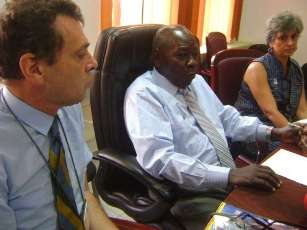South Sudan: Italy donates $1.2m to support women and children
By Julius N. Uma
December 13, 2010 (JUBA) Efforts to save lives of children and women in Southern Sudan, under the immunization and maternal health project has been boosted, courtesy of a $1.2 million contribution from the Italian government working in close collaboration with the health ministry and United Nations Children Fund (UNICEF).

Over 113,000 children (from 6-59 months) and 148,500 women of child bearing age will reportedly benefit from immunization of measles and TT2 respectively.
Additionally, the grant has been earmarked to support 18,800 women, through provision of clean delivery kits and regular antenatal care, while also ensuring that childbirth is assisted by 100 adequately trained traditional birth attendants or village midwives.
Dr. Mauro Ghirotti, the Director for Italian Cooperation Development office acknowledged the formidable challenges that lie ahead, and reiterated his government’s commitment towards supporting women and children in the semi-autonomous region.
According to Dr. Ghirotti, a total of 40 midwives from Southern Sudan have already been earmarked for training in Egypt, as part of efforts to strengthen collaboration between the Egyptian government and its Italian counterpart.
Records from the Southern Sudan health ministry indicate that the region currently has less than 10 qualified midwives and its maternal mortality rates are among the highest in the world.
In his remarks on behalf of the health ministry, Dr. Samson Paul Baba, the acting Undersecretary lauded the existing cooperation between UNICEF and the two governments, saying it provides a strong foundation for improving health care needs in communities.
The health minister, Dr. Baba said, has already developed a strategic health plan for selected areas known to be the worst affected including Lakes, Warrap, Northern Bahr el Ghazal, Western Equatoria and Jonglei.
Meanwhile, plans are already underway to form Hospital Management Boards (HMB), which will be tasked with helping the government run state-owned hospitals. Each HMB, Dr. Baba said, will comprise of 12 members drawn from the private sector, public arena and academia.
During the press conference held in Juba, the Southern Sudan capital, Jamelia Sake, a midwife, also shared her work experiences, a testimony that highlighted the daunting challenges that largely characterize the state of the health sector in the region.
Most of these health systems are extremely weak, with inadequate qualified personnel. To-date, over 80% of deliveries in Southern Sudan are handled by traditional birth attendants.
(ST)

Padiet Deng Alony
South Sudan: Italy donates $1.2m to support women and children
Thanks Italian for that project that will reduce maternity death rate in South Sudan. Southern Sudan Goverment should focus on Health,Agriculture and Education. Sound mind in Sound Body